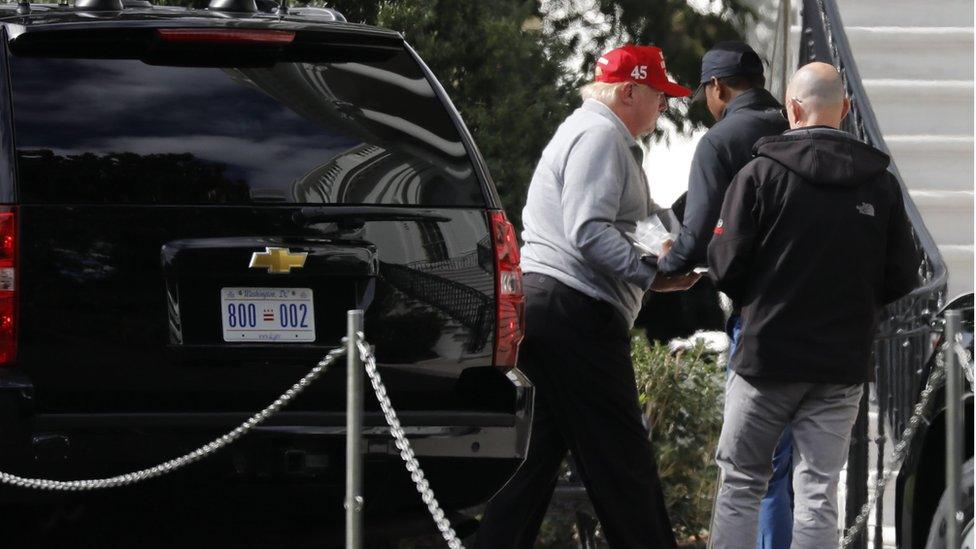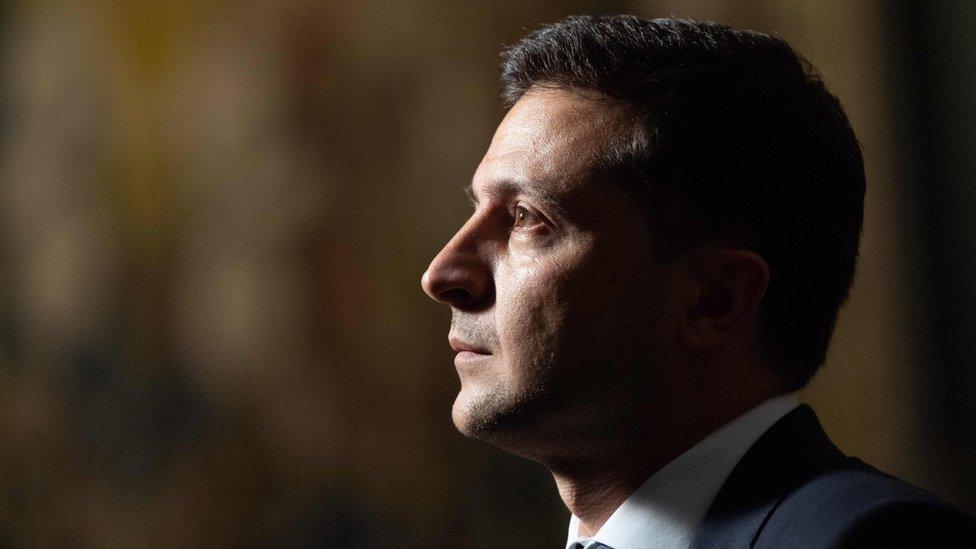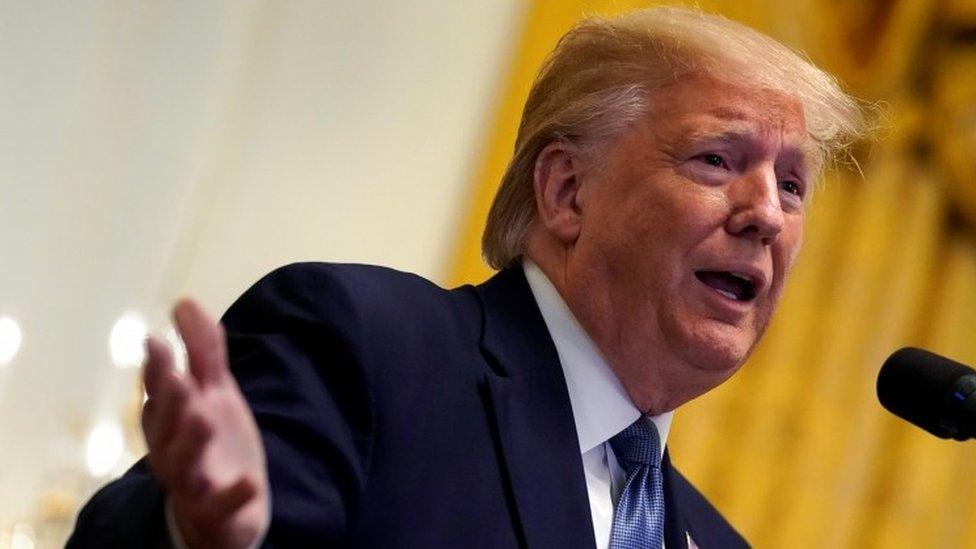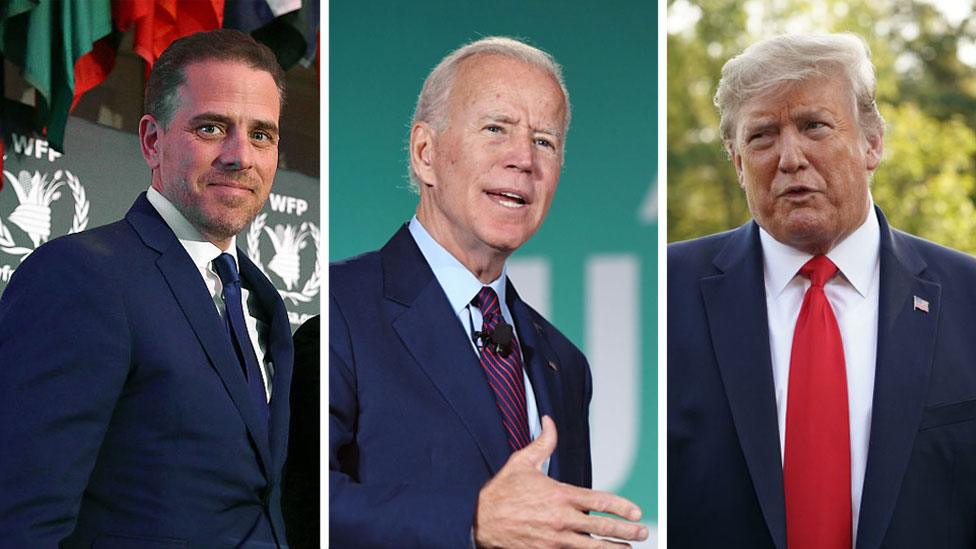Trump impeachment: Second whistleblower emerges
- Published

US President Donald Trump returning to the White House after a game of golf on Saturday
A second whistleblower has come forward in the impeachment case against US President Donald Trump, according to lawyers representing the first one.
Mark Zaid told ABC News the second person was also an intelligence official and they had spoken to the inspector general.
Late on Sunday night, Mr Trump lashed out at Democratic leaders, suggesting they should be impeached.
No details have been released about the second whistleblower's claims.
However, Mr Zaid said the person had first-hand knowledge of allegations associated with the phone call Mr Trump made with Ukrainian President Volodymyr Zelensky on 25 July.
The impeachment inquiry stems from the call, which was flagged up by the initial whistleblower in August.
Allow X content?
This article contains content provided by X. We ask for your permission before anything is loaded, as they may be using cookies and other technologies. You may want to read X’s cookie policy, external and privacy policy, external before accepting. To view this content choose ‘accept and continue’.

On Friday, the New York Times reported that a second person was considering coming forward who had "more direct information" about the events surrounding the call.
It is not yet known if this is the person represented by Mr Zaid.
Mr Trump's personal lawyer Rudy Giuliani tweeted that he was not surprised there was another "secret source", calling the inquiry politically motivated and lashing out at the "swamp media".
What difference could a second report make?
The Democrat-led investigating committee is eager to speak to someone who witnessed the call directly or has more information.
They are hopeful that this could be that person.
The second source has not yet filed an official complaint or spoken to the committee.
However, the New York Times says the person spoke to the intelligence community's inspector general, who has reportedly been seeking to corroborate the first testimony.
The White House insists it has been open and it released a transcript of the call, after the concerns came to light.
However, investigators point out that this was only a partial transcript. They have subpoenaed the State Department for more documents related to the call.
On Saturday, Secretary of State Mike Pompeo said he would comply with the request, but complained that his staff were being harassed.
But White House spokeswoman Stephanie Grisham said the new whistleblower changed nothing.
She said in a statement: "It doesn't matter how many people decide to call themselves whistleblowers about the same telephone call - a call the president already made public - it doesn't change the fact that he has done nothing wrong."
What has Trump said?
Late on Sunday night, Mr Trump raged against Adam Schiff, chairman of the House intelligence committee who has played a prominent role following the first whistleblower's complaint, and House Speaker Nancy Pelosi.
Allow X content?
This article contains content provided by X. We ask for your permission before anything is loaded, as they may be using cookies and other technologies. You may want to read X’s cookie policy, external and privacy policy, external before accepting. To view this content choose ‘accept and continue’.
Allow X content?
This article contains content provided by X. We ask for your permission before anything is loaded, as they may be using cookies and other technologies. You may want to read X’s cookie policy, external and privacy policy, external before accepting. To view this content choose ‘accept and continue’.

Four quick questions on Trump-Ukraine
Trump impeachment: Was there quid pro quo?
Why is Mr Trump being investigated?
A whistleblower alleges he used "the power of his office to solicit interference from a foreign country in the US 2020 election", by asking Ukraine to investigate his leading rival, Joe Biden.
Is this illegal?
If this is what he's proven to have done, then yes: it is illegal to ask foreign entities for help winning a US election. Mr Trump says it's a witch-hunt and he did nothing wrong.
What could happen next?
If the Democrat-controlled House of Representatives voted to impeach Mr Trump, there'd be a trial in the Senate.
Could he be removed?
A Senate vote needs a two-thirds majority to convict, but Mr Trump's Republican party controls the Senate so that's unlikely. And the Mueller inquiry made clear you can't charge a sitting president with a crime.
What does it take to impeach a president?
- Published20 January 2020

- Published5 October 2019

- Published5 February 2020
